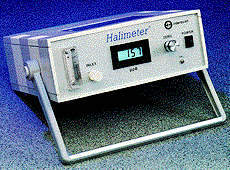
ODOR
Most odors are caused by specific molecules called sulfides. If these odors are disagreeable, as is the case with halitosis, it becomes important to eliminate those molecules supporting the breath problem. The detection and interpretation of odor complicates the problem of halitosis therapy. Some people love the smell of garlic, for example; others hate it. The same can be said of thousands of other odors that assail all of us. Not only does odor mean different things to different people, but taste enters the picture as a strong, modifying factor. Oral malodor is basically the result of an overgrowth of a special kind of bacteria that is naturally found in the mouth. This type of bacteria produces volatile sulfur compounds (VSC) and these compounds are what is smelled when detecting bad breath.DIAGNOSIS

 The PERIOTEMP
measures elevated temperatures in the periodontal pocket surrounding the
teeth. If an elevated temperature reading is detected , this equates with
the degree of inflammation that is occurring at a specific gingival site.
This inflammation directly relates to the presence of periodontal (gum)
disease. The specific bacteria that cause malodor, also is responsible
for causing periodontal disease.
The PERIOTEMP
measures elevated temperatures in the periodontal pocket surrounding the
teeth. If an elevated temperature reading is detected , this equates with
the degree of inflammation that is occurring at a specific gingival site.
This inflammation directly relates to the presence of periodontal (gum)
disease. The specific bacteria that cause malodor, also is responsible
for causing periodontal disease.
Odors must be eliminated on the molecular level before halitosis can be controlled. Masking of odor is only transient. It is not only ineffective, but it generally creates an additional odor problem that is also disagreeable, and more complex than the original smell. Studies such as in Consumer Reports have shown that mouthrinses and other commercial products have effects that are very short lived (as in a few minutes) and NO SIGNIFICANT EFFECT on halitosis.THERAPY
After proper testing and diagnosis is completed, the patient is first educated in the cause/effect of breath malodor. The most successful therapy is using oral cleansing instruments and medicaments that eliminate the offending bacteria and specifically neutralize the offensive sulfur gases on the molecular level. It is essential to clean the tongue either by brushing or by using a tongue scraper designed for this function.